Vegan Refuses To Remove Wasp Nest From The Patio, Scared Roommate Threatens To Take Actions
Living with roommates can be challenging, especially when we argue about seemingly insignificant things. One common issue that can cause disputes is when insects enter our shared living spaces.
Some of us may have irrational fears or phobias about these bugs, while others understand their importance in the ecosystem and prefer to protect them instead of getting rid of them. In situations like this, we need to communicate openly and empathize.
We should understand each other's perspectives and work together to find a solution that respects everyone's comfort and well-being. Educating ourselves and each other about the insects involved can be helpful, dispelling any unfounded fears and taking a more rational approach.
It's also worth considering the benefits that these insects provide. For example, wasps help control mosquito populations, protect our gardens from pests, and even assist in the decomposition process of compost.
Recognizing and appreciating these contributions can help ease concerns and create a more harmonious living environment. Taking practical steps, such as using window screens or sealing openings, can provide security while allowing fresh air and natural light into our space.
Regular cleaning and maintenance can also help reduce the presence of insects. Balancing personal comfort and environmental considerations is crucial when dealing with insect conflicts.
We should strive to foster understanding, respect, and cooperation among ourselves, addressing fears and finding solutions that prioritize our well-being while preserving the natural world. In OP's specific situation, he invited a friend to live with him, recognizing the challenges of finding affordable housing.
However, his friend frequently starts arguments, possibly due to her upbringing. When a wasp nest appears on their back patio, the friend insists on removing it due to her fear.
On the other hand, OP doesn't want to harm the wasps, believing they will naturally go away in a few months. This disagreement has led to ongoing arguments, leaving OP wondering if he should give in. He is questioning whether it's wrong for him to stand his ground and not eliminate the wasps.
Friend insists on eliminating wasps, but OP refuses due to vegan beliefs and the benefits they provide, like mosquito control.
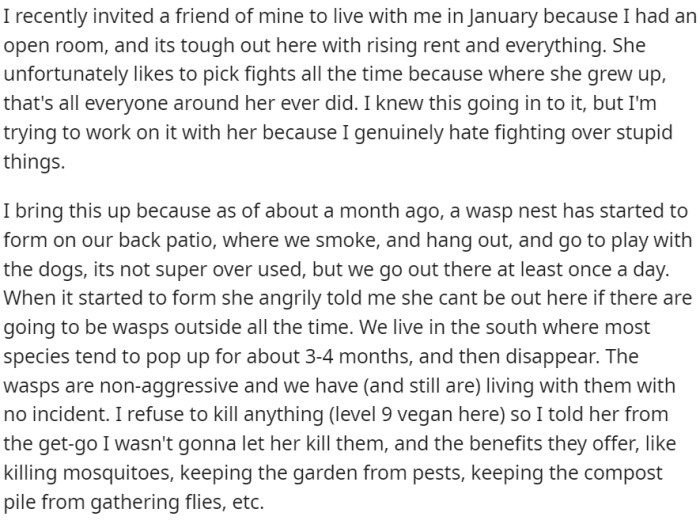
The roommate wants to kill the wasps due to a phobia, but OP refuses and tells her to get over it because the wasps will only be around for a few more months.

Resident's comfort and fear of wasps are valid concerns.

Understanding Fear Responses in Conflict
Research from the Journal of Personality and Social Psychology indicates that fear responses can significantly influence behavior in shared living situations.
When one roommate feels threatened or uncomfortable—like with the wasp nest—it can trigger defensive reactions and escalate conflict.
Recognizing these emotional responses is essential for navigating roommate dynamics effectively.
Understanding Fear and Its Psychological Roots
The refusal to remove the wasp nest may stem from a deeply ingrained fear response, which can be linked to the concept of phobias in psychology.
According to research published in the Journal of Abnormal Psychology, phobias often arise from negative experiences that create lasting associations between a stimulus and fear.
In this case, the roommate's fear could be heightened by a past incident involving wasps or a general anxiety towards insects, which often leads to avoidance behaviors.
Relocate or hire a professional to remove the hive without harm.

OP should consider the feelings and fears of others living in the space.
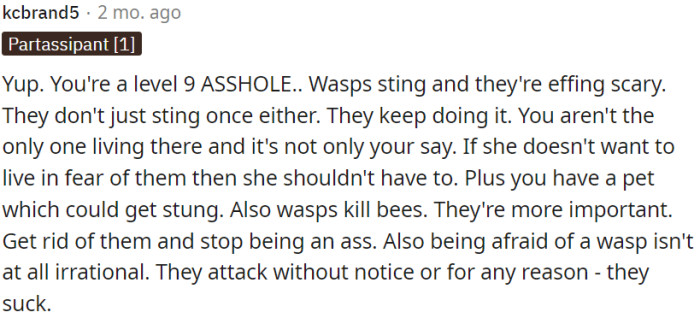
Concerns about safety and potential allergies should be prioritized over preserving aggressive wasps.
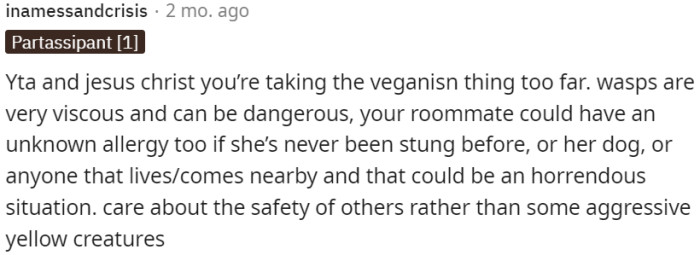
According to studies from Stanford University, fear can lead to irrational decision-making, particularly when individuals feel their safety is compromised.
In this case, the fear of wasps may have led to an exaggerated response from the roommate.
Encouraging open discussions about safety concerns can help align expectations and reduce tension.
Fear responses are part of our evolutionary survival mechanisms, where quick reactions to perceived threats can be life-saving.
In a shared living environment, these fears can lead to conflict, particularly when one party feels endangered while the other feels justified in their stance.
Psychological research indicates that communication is crucial in resolving such conflicts, where discussing fears openly can mitigate misunderstandings and foster compromise.
The roommate has a right to feel safe and not be afraid of being stung by aggressive wasps, even if they have beneficial aspects.

Consider seeking assistance from someone else to remove the wasps to ensure a fear-free living space.

If OP is concerned about killing them, he could consider calling someone to relocate the hive.

The Importance of Empathy in Conflict Resolution
Empathy is crucial in resolving conflicts, as highlighted by research from the University of Virginia.
When individuals approach each other with compassion and understanding, it can significantly improve relationship dynamics and reduce tensions.
In this case, fostering empathy between roommates can lead to more amicable solutions regarding shared spaces.
Conflict Resolution Strategies
Experts suggest employing techniques such as active listening and empathy in resolving roommate disputes.
By acknowledging each other's fears and perspectives, roommates can negotiate solutions that respect both parties' needs.
For instance, the vegan roommate could explore non-lethal methods of wasp removal, such as consulting a pest control expert who specializes in humane removal.
The potential danger of wasp stings should not be underestimated.

Respect others' wishes and consider potential risks, even if it contradicts personal beliefs.

The concern about prioritizing the well-being of wasps over that of a friend and roommate.
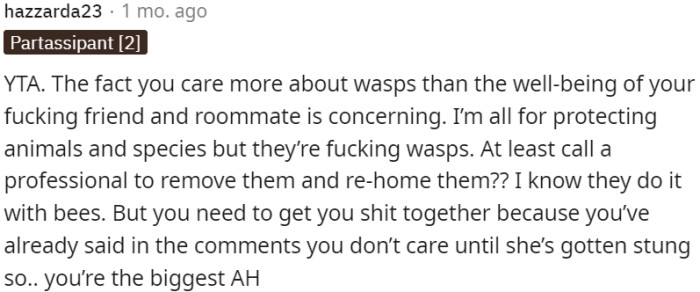
Behavioral psychology emphasizes the importance of recognizing and validating each other's fears and concerns.
When individuals feel heard and understood, it can create a sense of safety and support in shared living situations.
Regular check-ins about comfort levels regarding shared spaces can enhance roommate dynamics significantly.
Moreover, understanding the psychological concept of cognitive reframing can be beneficial in this situation.
Research from the American Psychological Association indicates that reframing a situation can lessen fear and anxiety, allowing individuals to view problems from a different, less threatening perspective.
In this case, the vegan roommate could reframe the wasp nest as an opportunity to learn about ecological balance and the importance of pollinators, rather than solely as a threat.
If OP is unwilling to eliminate the wasps, it may be worth allowing his roommate to take action for her safety and peace of mind, as it is her home as well.

If there's no real danger or allergy involved, people should relax and understand that not all fears of nature are rational.
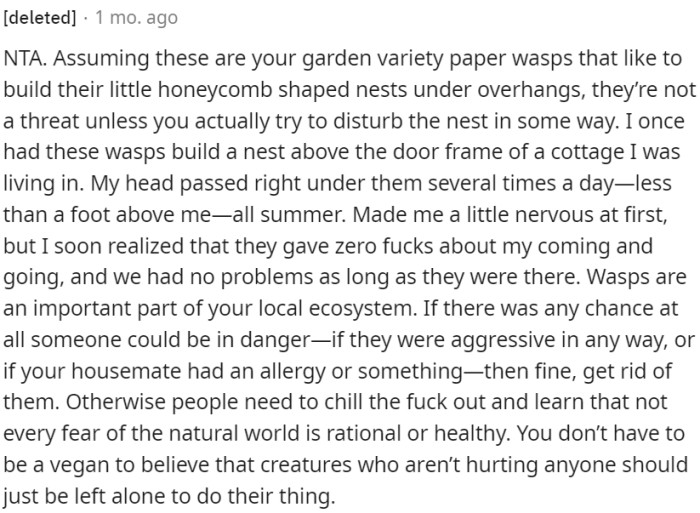
When dealing with conflicts over insects or other natural elements among roommates, it's essential to communicate openly and understand each other's fears. While prioritizing safety, it's also valuable to recognize the minimal threat of certain insects, like paper wasps, and their ecological significance.
Respecting creatures that aren't causing harm and allowing them to fulfill their role in nature can lead to a more peaceful living environment. By finding common ground and balancing personal comfort with environmental considerations, roommates can create a harmonious space where everyone feels at ease.
Behavioral Insights on Roommate Conflicts
Behavioral psychology suggests that our reactions to conflicts often reflect deeper underlying issues, such as stress or past trauma.
In roommate situations, the stress of shared spaces can amplify emotional responses, leading to extreme reactions like threats of violence.
Understanding this can help both parties approach the situation with more compassion and less judgment.
Psychological Analysis
This conflict illustrates the complexities of human interactions, particularly when fear and personal values clash.
Understanding each other's perspectives is crucial; both the vegan's ethical stance and the roommate's fear need to be addressed for resolution.
Analysis generated by AI
Analysis & Alternative Approaches
Ultimately, resolving conflicts like this requires both parties to engage in open dialogue about their fears and expectations.
Clinical research underscores the importance of communication and compromise in shared living situations, suggesting that mutual respect and understanding are key to harmonious cohabitation.
As Dr. John Gottman’s research indicates, successful relationships often hinge on how conflicts are managed and resolved, emphasizing that partners can learn to navigate these challenges with patience and empathy.
Psychological Analysis
This situation illustrates the complexities of fear responses in shared living arrangements.
From a psychological perspective, discussing safety concerns openly can help prevent misunderstandings and foster healthier interactions.
Analysis generated by AI
Analysis & Alternative Approaches
Understanding fear responses and fostering empathy are essential for preventing conflicts in shared living situations.
Research indicates that open communication about safety concerns can significantly improve relationships.
By creating an environment of understanding and support, roommates can navigate challenges more effectively and strengthen their bonds.



